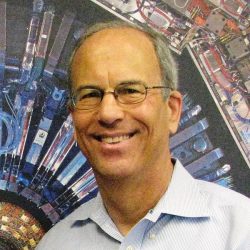- May 6, 2022, 7:30 pm US/Central
- Boaz Klima, Fermilab
- Tickets: Free but registration required
- Purchase tickets »
Join us for Part IV of our “How to Do Big Science” series when Fermilab Senior Scientist Boaz Klima, head of the CMS experiment’s publications effort over the last four years, will tell us about the peer review and publication process in CMS’s 3,000-member collaboration.
About 18 months ago the CMS collaboration reached a momentous milestone by submitting its 1,000th scientific paper for publication. In doing so, CMS became the first experiment in the history of high energy physics to publish this outstanding total number of papers. Not only has the number of papers produced by CMS reached an unprecedented level, but the diversity of physics topics covered is also unparalleled. Just one decade ago the high-energy physics field exploited three different types of accelerators to pursue separately research at the energy frontier, at the intensity frontier and on heavy-ion collisions under extreme conditions. In contrast, the advanced design of the CMS detector, made possible by a long program of R&D, and the remarkable flexibility of the LHC accelerator, have enabled CMS to publish world-class results probing all three boundaries of knowledge.
Klima joined Fermilab in 1989 to work on the DZero experiment at the Tevatron accelerator. Over the next 15 years, he was involved with many aspects of the experiment and served in a variety of leading roles. Klima co-led the Top Quark Physics Analysis group in DZero during the discovery of the Top quark in 1995. From 2001-2003, he served as the physics coordinator of DZero’s 700-member collaboration. He then joined the CMS experiment in 2004. Among Klima’s most notable responsibilities were the leadership of the LHC Physics Center (LPC) at Fermilab from 2013-2017 and leading the CMS publications effort from 2017-2021.
Over the past three decades Klima, an APS Fellow, has organized numerous international physics conferences worldwide. From 200-2010, he helped his Vietnamese colleagues join the experimental high-energy world by training many graduate students from Vietnam at Fermilab. In 2014, Klima was awarded the Medal of Science and Technology from Vietnam’s Ministry of Science and Technology.





